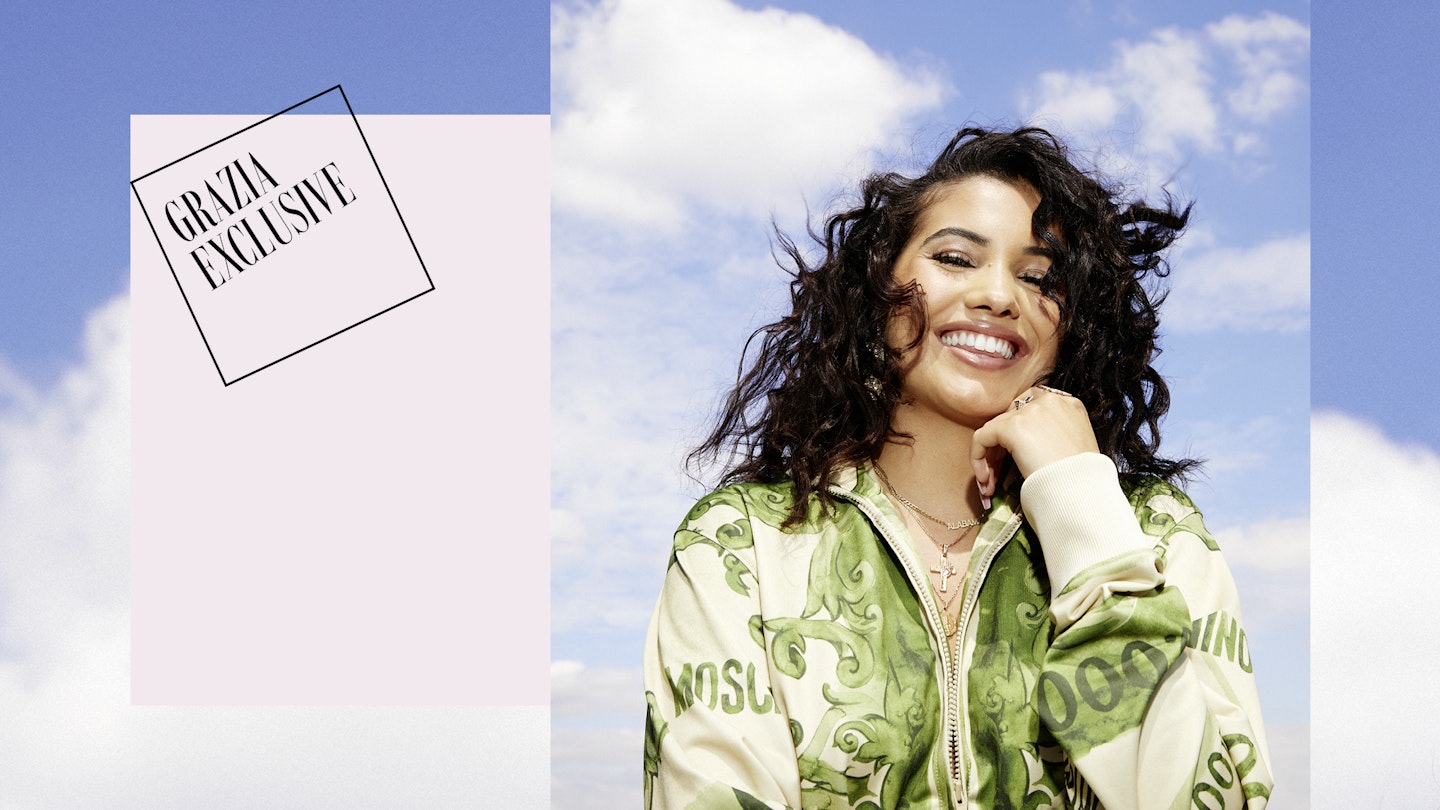Mabel is standing on the rooftop of Peckham Levels – a trendy former car park accessed by an Insta-famous pink staircase – in full Moschino. While she pouts, then switches to a pretend laugh, a class of young schoolchildren spot her. They begin waving and jumping up and down.
After she’s finished the shot, she casually strides over to said children, asking them how their school trip is going, and then – one by one – starts hugging them. Within seconds, she has 10 tiny pairs of hands embracing her. She deals with the mini- human-pile-on expertly, then offers to take a picture with her new friends.
She crouches down in front of them for a moment, and then it’s back to work. She seems born to be a soulful pop star. Maybe she was: her parents are singer Neneh Cherry and Cameron McVey, the producer behind Massive Attack and All Saints. ‘There were always creative people in the house,’ she tells me after she’s changed into something more comfortable (a Calvin Klein sports bra). ‘My dad produced the first Sugababes album, which was fire! He would take me to hang out with them when I was about four or five.’
Mabel, who was nominated for a BRIT Award last year, felt compelled to write her first song when she was aged just five. ‘I wrote this love song to a boy in my class,’ she laughs. ‘I hadn’t figured out how to play chords yet.' Born in Malaga, music was an important outlet for Mabel growing up in Sweden and London – she experienced anxiety and depression for ‘pretty much the whole’ of her teenage years. ‘I had very big questions about war and death from a very young age,’ she tells me. Her depression and social anxiety forced her to drop out of school in Sweden. But her parents, she says, were sympathetic. ‘They were like, “It’s cool, you feel more, you need to express yourself and be vocal.” I had dark thoughts, but they were like, “Here’s a piano, make some art.”’
It’s hard to believe that this astute, successful and confident 23-year-old suffers from crippling anxiety – something she’s documented in her lyrics. ‘It still comes out to play sometimes: you have this voice when you’re depressed saying, “You can’t do this; you’re not good enough for that one person.” But through making cathartic music – and especially her new album High Expectations – she’s ‘pieced’ herself back together. ‘I make sense of things through writing,’ she says. ‘It was like building blocks, and by the time I finished the album, I was a whole new person in terms of my confidence. I realised that I’m OK with the good stuff and the bad stuff – I f**k with it.’ There’s one particular song, Okay Anxiety Anthem, which Mabel created while she was feeling ‘really low’. Instead of cancelling her session, she headed to the studio in her pyjamas (‘I looked like shit and I felt like shit,’ she says) and came up with the euphoric chorus, ‘It’s OK to not be OK.’
‘It became this really positive way of looking at anxiety,’ she recalls, insisting it ‘genuinely changed’ the way she felt about it. ‘I used to be ashamed. I didn’t know how to explain it to people. But I’m not embarrassed; it’s an important part of who I am.’ Mabel is all about turning the negatives into positives. Don’t Call Me Up, which reached number eight in the charts, is about ‘the worst relationship experience of my life’. She adds, ‘He completely fked me over. I was broken.’ Mabel’s distinctive vision and her personal lyrics show that she’s calling the shots but, she says, it wasn’t always like this. ‘When I first started going to music rooms, which are very male-dominated, I had to get comfortable with being able to own my own space and rights.’ Working with rappers is, she says, particularly indicative of the divide. ‘As women we’re expected to have a certain level of appearance. I do glam for two hours and then they turn up 20 minutes before we’re supposed to start shooting; it’s fked up.’
She is hopeful, though. ‘We still have a long way to go, but the fact that we’re talking about it is really positive. The conversation can’t die down now,’ she adds. Having female collaborators on the album was ‘vital’ for Mabel. ‘It’s all about supporting each other and encouraging other women to be producers and engineers. It’s a crazy concept that, as females, we’re pitted against each other, like Rihanna or Beyoncé, Cardi B or Nicki Minaj. But why would we compete? We’re all different. We’re all in different lanes. We need to stand together.’
Mabel has a firm grasp on her ambitions. She wants a number one, to write with Pharrell Williams, and she’s preparing for a tour in 2020 after some practice as a support act for Harry Styles. ‘He brought the same kind, beautiful energy to every person I saw him meet,’ she says. ‘I didn’t see him have an off day. Sometimes, when I’m feeling anxious or low, I have a tendency to be like, “Not today.” But I learned a lot on that tour: that we’re so lucky. He just has that positivity – it oozes out of him. He’s a rock star; he’s Mick Jagger.’ Stormzyis another musical mentor of Mabel’s. ‘He knew who I was before Finders Keepers,’ she says. ‘He’s always been so kind and supportive, he’d be like, “You’re doing your thing.”’
Friendships with Harry and Stormzy aside, she still has time to visit her parents’ house in West London, where her dad does her laundry. ‘I’m this crazy extrovert on stage, but then after shows I just want to go home, cook, talk to my friends and be away from the madness.’
‘High Expectations’ is out now
